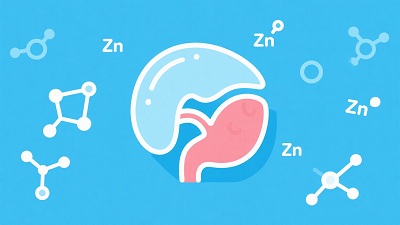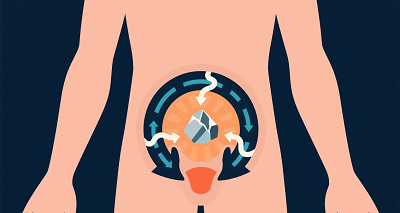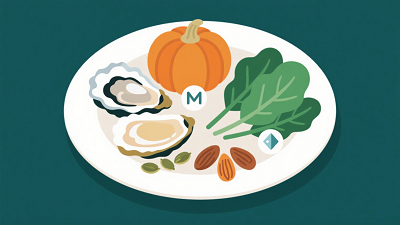The Role of Zinc and Other Minerals in Maintaining a Healthy Prostate
If you’ve ever searched for ways to support prostate health or relieve symptoms like pelvic discomfort, frequent urination, or urinary urgency, you’ve likely come across zinc. This essential mineral is highly concentrated in the prostate and plays roles in immune function, tissue repair, and cellular metabolism. But how much does zinc actually help, and what about other minerals such as selenium, magnesium, copper, and potassium? This guide brings together what the research shows, how to get these nutrients safely, and practical steps you can take today.

Why the Prostate Needs Zinc
The prostate accumulates more zinc than most other organs. That high concentration isn’t an accident: zinc helps the gland maintain normal function in several ways.
Immune and antimicrobial activity: Zinc participates in the formation and activity of antimicrobial proteins in prostatic fluid, supporting the gland’s defenses.
Cellular repair and antioxidant support: Zinc helps stabilize cell membranes and supports enzymes involved in DNA repair and antioxidant protection.
Hormone metabolism: Within prostate cells, zinc influences enzymes involved in androgen metabolism, helping maintain a healthy hormonal environment for the tissue.
What clinical research says about zinc and prostatitis
A randomized clinical trial of men with NIH category IIIA chronic prostatitis/chronic pelvic pain syndrome tested daily zinc sulfate (220 mg) versus placebo for 12 weeks. While early differences between groups were small, by week 12 the zinc group experienced statistically significant improvements in total symptom score and pain compared with placebo. The authors concluded zinc “may benefit” management of this condition, likely through antibacterial and immunomodulatory effects (Source: PubMed, 2014; https://pubmed.ncbi.nlm.nih.gov/24448329/).
What this means for you:
Zinc is not a cure-all, and one study cannot settle the question. But in men with inflammatory chronic prostatitis, zinc supplementation showed meaningful pain and symptom relief by 12 weeks.
Any supplement should complement, not replace, a comprehensive plan that can include pelvic floor therapy, lifestyle measures, and treatments recommended by your clinician.
How much zinc makes sense?
Your body needs zinc every day, and many people get enough through food. Some individuals—such as those with chronic inflammatory prostate symptoms, limited dietary variety, plant-based diets high in phytates, or malabsorption—may benefit from targeted supplementation under professional guidance.
Practical guidance
Food-first approach: Aim to meet daily needs from diet and consider supplements if symptoms persist or your clinician identifies a shortfall.
Short-term trial: If you and your clinician decide to try zinc for chronic prostatitis symptoms, discuss an appropriate dose and duration. In the referenced study, participants took 220 mg zinc sulfate daily for 12 weeks, which typically provides a moderate dose of elemental zinc (Source: PubMed, 2014).
Safety matters: High doses of zinc for extended periods can cause side effects such as nausea, abdominal discomfort, altered taste, and reduced copper absorption, potentially leading to anemia or immune changes. Avoid long-term high-dose zinc unless closely supervised by a healthcare professional.
Balance with copper: Zinc and copper compete for absorption. If taking zinc above typical daily needs for more than a few weeks, ask your clinician about monitoring or balancing copper intake.
Best dietary sources of zinc for men
A varied diet can cover most men's zinc requirements.
Top sources: Oysters (among the richest), beef, lamb, and dark-meat poultry.
Plant-based sources: Chickpeas, lentils, black beans, pumpkin seeds, hemp seeds, cashews, and whole grains.
Absorption tips: Phytates in whole grains and legumes can reduce zinc absorption. Soaking, sprouting, fermenting, and pairing with protein-rich foods can improve bioavailability. Diversifying across animal and plant sources helps, too.

Other minerals that matter for a healthy prostate
While zinc often takes center stage, prostate and urinary health depend on a broader mineral picture.
Selenium
Why it matters: Selenium is essential for selenoproteins with antioxidant and anti-inflammatory roles, supporting cellular protection in reproductive tissues.
Where to get it: Seafood, eggs, whole grains, and Brazil nuts (a small amount goes a long way).
Practical note: Avoid mega-dosing; aim for steady, food-based intake unless your clinician recommends otherwise.
Magnesium
Why it matters: Magnesium supports muscle relaxation, nerve signaling, and energy metabolism. Adequate levels may help with pelvic floor muscle tone and overall urinary comfort.
Where to get it: Leafy greens, beans and lentils, almonds and cashews, pumpkin seeds, and whole grains.
Practical note: Many adults fall short on magnesium through diet; a food-first approach plus periodic checks with your clinician can be helpful.
Copper
Why it matters: Copper is essential for connective tissue integrity, red blood cell formation, and immune function. It also balances with zinc—excessive zinc intake can lower copper absorption.
Where to get it: Shellfish, organ meats, nuts, seeds, and cocoa.
Practical note: If you are using zinc supplements above typical daily needs for longer than a few weeks, ask your healthcare provider whether copper should be monitored.
Potassium
Why it matters: Potassium helps regulate fluid balance and blood pressure, supporting vascular health that benefits the urinary tract and pelvic organs.
Where to get it: Fruits (bananas, oranges), vegetables (leafy greens, potatoes), legumes, and dairy.
Calcium and the bigger diet picture
Calcium is vital for bone and muscle function; aim for recommended intakes from food (dairy, fortified alternatives, leafy greens) rather than very high-dose supplements. A balanced, mostly plant-forward plate with adequate protein and healthy fats supports long-term prostate health alongside minerals.
Who may benefit from extra attention to minerals
- Men with chronic pelvic pain or chronic prostatitis symptoms
- Those with limited intake of seafood, meat, or legumes
- Individuals on high-phytate diets (very high whole grains/legumes without soaking/sprouting)
- Vegetarians and vegans, especially without careful menu planning
- Men with gastrointestinal conditions affecting absorption (e.g., celiac disease, inflammatory bowel disease) or post-bariatric surgery
- Highly active men with heavy sweat losses
- Older adults with reduced appetite or dietary variety
A simple, sustainable plan to support prostate health with minerals

Build a zinc-savvy plate most days:
Option A: Grilled salmon or lean beef, a side of lentils, sautéed spinach, and a small handful of pumpkin seeds
Option B: Chickpea and quinoa bowl with roasted vegetables, tahini dressing, and a side of yogurt (or fortified plant yogurt)
Rotate selenium-rich foods 2–3 times weekly: seafood, eggs, or 1–2 Brazil nuts on non-seafood days
Add magnesium-rich choices daily: leafy greens, beans, nuts, seeds, or whole grains
Hydrate well and favor potassium-rich produce to support urinary comfort
If considering a zinc supplement for chronic prostatitis symptoms, discuss an evidence-informed, time-limited trial with your healthcare provider (for example, up to 12 weeks), and plan follow-up to reassess benefits and side effects (Source: PubMed, 2014)
Common myths to avoid
"Mega-dosing zinc cures prostatitis." Evidence does not support indiscriminate high-dose zinc as a cure. One randomized trial suggests benefit over 12 weeks for chronic inflammatory prostatitis, but treatment should be individualized and monitored. More research is needed, and long-term high-dose zinc can cause harm (Source: PubMed, 2014).
"Food alone can't provide enough zinc." Many men can meet their needs from diet with thoughtful choices. Supplements are a tool—not a requirement—for everyone.
When to seek medical advice
New or worsening urinary symptoms, pelvic pain, blood in urine or semen, fever, or difficulty urinating
- Symptoms that persist despite dietary changes
- If you plan to take zinc above typical daily needs or for longer than a few weeks
- If you have a history of kidney stones, chronic disease, or take medications that may interact with minerals
The bottom line
Zinc plays a central role in maintaining a healthy prostate, and emerging clinical evidence suggests a time-limited zinc supplement may help some men with chronic inflammatory prostatitis symptoms.
Still, prostate health is about balance: adequate zinc from food, the right mix of selenium, magnesium, and copper, smart hydration and potassium intake, and individualized care when symptoms arise. Start with a nutrient-dense plate, consider a carefully monitored supplement trial if needed, and work with your clinician to personalize the plan.
References
Randomized clinical trial of zinc supplementation in chronic prostatitis/chronic pelvic pain syndrome: https://pubmed.ncbi.nlm.nih.gov/24448329/



